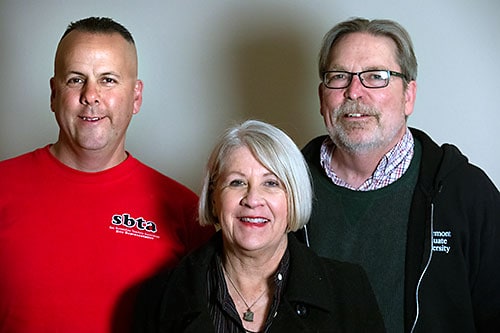Democratic state delegate election takes twists, turns

After a hectic process involving three ballot counts, three Claremont residents, Mike Boos, Pamela Casey-Nagler and Joseph Salas were elected as California state party delegates.
Shayok Chakraborty, a Pomona College student, initially lost, then was declared to have won a seat in a recount, but then lost again after a second recount.
The final results have still not yet been posted on the state party website for the election, which took place more than two months ago. The process, in which each count of ballots delivered different numbers, has prompted frustration and uncertainty among delegates from Claremont.
Delegates will organize within Assembly District 41 and vote on a variety of issues at the state convention, including which candidates the state Democratic party endorses for political office, according to the state party website.
The delegate election procedures include a process for any candidate to challenge the results of an election, according to state party spokesperson Roger Salazar. Two such challenges—to the initial count and then the recount numbers, prompted these recounts.
He added that three counts of the vote in one election is “not unusual but not normal.” The issues in the original vote were caused by a calculator error, Mr. Salazar said.
In the second count, Unique Wilson, the state Democratic party resources manager, mistakenly wrote that a candidate had received 228 votes rather than 278. A District 41 candidate who traveled to Sacramento to review the ballot results spotted this error, according to an email from Ms. Wilson to the candidates.
Recounts are “done with observers from all sides in plain view” which “should be enough to satisfy anyone” concerned about the results, Mr. Salazar said.
He said the state Democratic party is confident in the latest count, and the final results should be posted to the party website soon, after final certification is complete.
Mr. Boos wrote in an email to the COURIER that the recounts created a lot of uncertainty and stress and “threatened to undermine the legitimacy of the process.”
“I have been disappointed in the party’s seeming ambivalence toward following protocol, and its apparent lack of interest in getting to the bottom of why the early discrepancies were so large, which would seem to be in the spirit of correcting such problems in future elections,” Mr. Boos related. “Instead it was up to candidates and other dedicated individuals to press for answers and a fair result.”
Mr. Boos added, however, that he still has confidence in the state party and the recounts were necessary to ensure an accurate result.
Mr. Salas said he has “very little confidence in the newest results” and that it was unclear to him how the vote counts for some delegates have fluctuated through the recounts while others have remained the same.
“For people who became involved with the process for the first time, these recounts can leave a very bad impression in the minds of voters, candidates and the general public,” he said.
Ms. Casey-Nagler was “taken aback” by the “wild fluctuation” in the first recount, nearly a month after the initial vote, and said the process “disheartened” her.
Mr. Chakraborty shared the delegates concerns.
“I am finding myself more baffled and perplexed than anything at the incompetence and bizarre design of the delegate election process by the state party,” Mr. Chakraborty said, comparing the process to the political satire show Veep.
“It is confusing that the state party has such a poor system for convening elections, especially considering our platform of voting rights for all.”
Mr. Salazar said that errors do happen in the counting process, which is “why we have the challenge process and these recounts,” and emphasized “we’re very confident that the process has worked out the way it’s supposed to and we’re going to have an accurate result.”
At no point during the recounts were the seats of Mr. Salas, Ms. Casey-Nagler or Mr. Boos challenged.
As delegates, Ms. Casey-Nagler and Mr. Boos told the COURIER they plan to advocate for a Green New Deal, Medicare for All, tuition-free college and college debt relief, a livable wage, reducing the role of large financial powers in politics, fully-funded public education, immigration and criminal justice reform, gun violence legislation, voters’ rights, affordable housing and ending lengthy foreign conflicts.
Many of Mr. Salas’ priorities are similar. He will also call for a ban on payday loan companies, universal preschool, programs to combat food insecurity, an end to family separations at the US southern border, improved mental health services in prisons and the founding of a contiguous Palestinian state, according to a statement emailed to the COURIER.
In the wake of the recounts, each of the candidates also proposed reforms to the delegate election process to increase confidence in the results among voters and candidates.
Mr. Salas believes the party’s Rules Committee and Credential Committee should discuss proposals to “remedy the need for recounts” and election meeting organizers should discuss best practices for counting ballots with state party staff, including double blind ballot counts.
Mr. Boos said changes will need to be made to guarantee transparency and integrity going forward.
“I’d like to see the party expand the percentage of delegates elected in the process and overall take the elections more seriously by promoting them publicly and paying more attention to fairness and transparency,” he shared.
Currently, only one-third of state delegates are elected by party members. One-third of the remaining delegates are chosen by county-level party committees from their own members and the final third are appointed by California Democratic elected officials and nominees, according to the party website.
Ms. Casey-Nagler said that the recounts have highlighted why participation in party politics is important.
“The more we invest in these systems, the more we can expect better outcomes,” she said.
—Marc Rod
marcrod1297@gmail.com








0 Comments